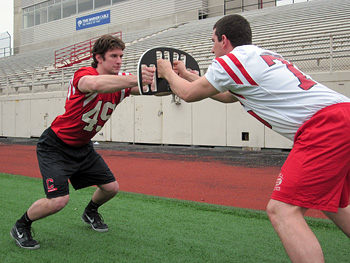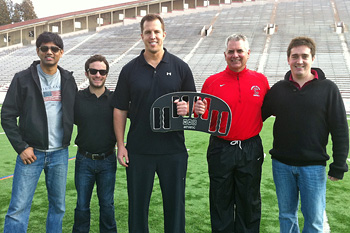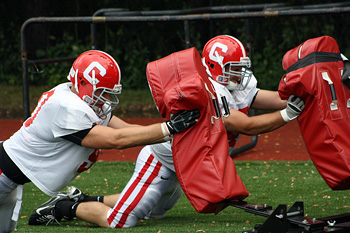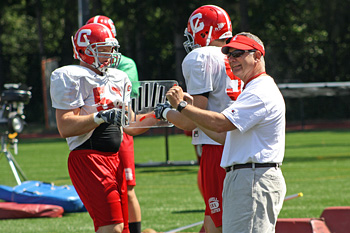Created at Cornell: BearClaw offers a lightweight, safer option for football drills

Dempsey Quinn '11, left, and Paul Ostick '11 use the BearClaw during a drill.
Pete DeStefano has spent 32 years coaching football, including the last 22 seasons as a member of the Big Red staff. He has helped 30 Cornellians receive All-Ivy honors. But over the past three years, the defensive ends coach has worked to develop something else as well: a product to help coaches teach football players proper hand positioning.
The BearClaw is a small, high-density polyethylene board with hand grips cut into it that replaces old-fashioned, heavy football sleds. The device is used primarily for offensive and defensive linemen drills. With two players gripping the board on opposite sides, the BearClaw forces athletes into proper blocking position.

From left: Michael Arulgnanendran (MADathletic CTO), Arthur Soroken (MADathletic CEO), Seth Payne '97 (advisory board member and former pro football player), coach Pete DeStefano (inventor and advisory board member) and David Croudace (MADathletic CFO) with the BearClaw.
For years, DeStefano ran these drills using a sawed-off lacrosse stick in place of the board, although "using the stick didn't allow for your hands to be in the right position for when you're playing football," he explains. "This device strengthens the proper position to be in as a football player. Anatomically, it brings your hands inside the framework of your body, which is the most powerful position. It forces your thumbs up, which forces your elbows in."
The 3.5-pound BearClaw allows players to move realistically -- sideways and up and down. Football sleds, long the standard, only move straight ahead and weigh several hundred pounds.
DeStefano turned to Ithaca Plastics to help create a prototype. He also called on the Cornell Center for Technology, Enterprise and Commercialization (CCTEC), which works with university inventors to protect their intellectual property rights and helps to market and license new technologies.

Football sleds, long the standard for practice drills, can only move straight ahead and weigh several hundred pounds; they also don't require players to use proper arm and hand positioning. Photo by Jeremy Hartigan.
CCTEC approached associate professor of clinical entrepreneurship Steve Gal with an opportunity for business school students to investigate promising CCTEC technologies. MBA student Arthur Soroken got the BearClaw project and recruited fellow MBA students Michael Arulgnanendran and David Croudace. After a successful presentation to the Cornell Board of Trustees, the trio formed MADathletic to bring the BearClaw to market.
Seth Payne '97, a Cornell Hall of Famer and a former pro football player, serves on MADathletic's advisory board, and Fred Barken '77 is an investor with the company.
Launched in November 2010, MADathletic has sold about 100 units to university football programs including those at Syracuse, Clemson, Villanova and Ohio State, as well as to numerous high school and Pop Warner teams. The BearClaw costs $150 (high school and older) and $130 for the youth size.

Coach Pete DeStefano works with players using a BearClaw prototype at a Big Red practice in fall 2010. Photo by Jeremy Hartigan.
The team also sees the BearClaw and related potential products finding a niche in physical therapy.
"I wanted [to make] something that could really strengthen our kids in a good way," says DeStefano. With heightened awareness of the danger of concussions in football, "you have to be able to play with your hands," he says. "The BearClaw teaches how to be combative with your hands, and that's how you play good football."
Related links: